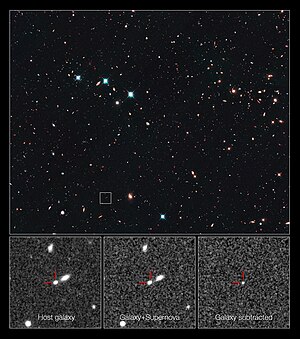SN UDS10Wil (SN Wilson)[4] is a type Ia supernova, and as of April 2013, the farthest known.[5]
 Record-breaking supernova SN UDS10Wil in the CANDELS Ultra Deep Survey[1] | |
| Ia | |
| Constellation | Cetus |
|---|---|
| Right ascension | 02h 17m 46s[2] |
| Declination | −05° 15′ 23″[2] |
| Epoch | J2000 |
| Distance | 16,600 megalight-years (5,100 Mpc) |
| Redshift | 1.914[2] |
| Other designations | SN UDS10Wil,[3] SN Wilson |
| | |
It has a redshift of 1.914, which strongly implies that it exploded when the universe was about a third of its current size. It was discovered with the Hubble Space Telescope's Wide Field Camera 3.[1] The nickname SN Wilson is after the American President Woodrow Wilson.[6]
See also
editReferences
edit- ^ a b "Hubble breaks record for furthest supernova". esahubble.org. 2013-04-04. Retrieved 2024-08-31.
- ^ a b c Jones, David O.; Rodney, Steven A.; Riess, Adam G.; Mobasher, Bahram; Dahlen, Tomas; McCully, Curtis; Frederiksen, Teddy F.; Casertano, Stefano; Hjorth, Jens; Keeton, Charles R.; Koekemoer, Anton; Strolger, Louis-Gregory; Wiklind, Tommy G.; Challis, Peter; Graur, Or (25 April 2013). "The Discovery of the Most Distant Known Type Ia Supernova at Redshift 1.914". The Astrophysical Journal. 768 (2): 166. arXiv:1304.0768. Bibcode:2013ApJ...768..166J. doi:10.1088/0004-637X/768/2/166. ISSN 0004-637X.
- ^ "NAME UDS10Wil". SIMBAD. Centre de données astronomiques de Strasbourg. Retrieved 2021-01-25.
- ^ Major, Jason (5 April 2013). "Hubble Spots the Most Distant Supernova Ever". Discovery Channel. Archived from the original on 26 March 2016. Retrieved 28 June 2015.
- ^ Yglesias, Matthew (2013-04-04). "Exploding stars: Supernova found is most distant of its kind yet". Slate.com. Retrieved 2013-04-08.
- ^ "Hubble Breaks Record in Search for Farthest Supernova". Hubble Space Telescope. 2013-04-04.